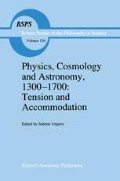Abstract
European science has its origin in Greece. Rationalism, openness to new ideas, the willingness to learn from others, freedom from religious constraints and superstitious fears, flexibility of mind, critical attitudes to tradition, — here is a random list of characteristics said to be common to Greek science and to ours. We have much to thank the Greeks for. Still: the inheritance of Greece has also been a heavy burden on European science. For some of its important legacies to posterity had for many centuries a potently inhibitory effect on scientific thought and enquiry. I need mention only the survival throughout antiquity and the middle ages (almost, though not entirely, without opposition) of such powerful models in astronomy as that of the geocentric universe, or of the circular motions of the heavenly bodies; or of teleology in the biological sciences; or of certain Greek attitudes to work and to the translation of science into technology.
Access this chapter
Tax calculation will be finalised at checkout
Purchases are for personal use only
Preview
Unable to display preview. Download preview PDF.
Notes
DK 21 A 33.
DK 12A 10, 11 and 30 = [Plut. Strom. 2; Hippol. Ref. I. 6,6; Censorinus IV. 7; Plut. Symp. VIII. 8,4 p. 730E.
See W. K. C. Guthrie, A History of Greek Philosophy, II (Cambridge, 1965), pp. 398f.
DK 67 A7.
See Aristotle, de anima I.2, 403 b 31ff.; Lucretius II. 112ff.; Lactantius, de ira dei, 10, 9. Note that Lucretius uses such expressions as simulacrum and imago (loc. cit.). In any case, a good deal of what some modern historians of ancient science describe as remarkable anticipations of modern physical theories is really nothing of the sort. It would be well if historians kept in mind the salutary warning of a recent biographer of Einstein: ‘… the most difficult task in studying past science is to forget temporarily what came afterwards’ (A. Pais, Subtle is the Lord, The Science and the Life of Albert Einstein (Oxford and New York, 1982), p. 9).
See below and also A. Wasserstein, ‘Epicurean Science’ in Hermes, 106 (1978), pp. 484–494.
See A. Wasserstein, ‘Greek Scientific Thought’ in Proceedings of the Cambridge Philological Society, N.S. 8 (1962), pp. 51ff.
Simplicius, in Arist. de caelo, 492, 31ff.; G. Schiaparelli, ‘Le sfere omocentriche di Eudosso, di Callippo e di Aristotele’, in Pubblicazioni del R. Osservatorio di Brera in Milano, IX (1875); J. L. E. Dreyer, History of the Planetary Systems from Thales to Kepler (Cambridge, 1906), pp. 89ff.; O. Neugebauer, The Exact Sciences in Antiquity (New York, 1962), pp. 153f; D. R. Dicks, Early Greek Astronomy to Aristotle (London, 1970), pp. 176ff. (with more modern literature). The clearest exposition for the non-specialist reader (and the most easily accessible) is still that by Sir Thomas Heath in Aristarchus of Samos (Oxford, 1913), (reprinted 1959), pp. 193ff. (based on Schiaparelli and Dreyer).
Ptolemy, Almagest III. 4, Heiberg I. p. 232.
Republic, VII. 529–530.
Simplicius, in Arist. de caelo, p. 504, 17–20.
See Euclid IX. 20; and cf. A. Wasserstein, Economy and Elegance (Leicester, 1961), pp. 14 ff.
For the history of the generalisation see A. Wasserstein, ‘Theaetetus and the History of the Theory of Numbers’, Classical Quarterly, N.S. VIII (1958), pp. 165ff. For the proof see Euclid, X, App. 27 (ed. Heiberg-Stamatis).
See Guthrie, Guthrie, A History of Greek Philosophy, (above, note 2), I, p. 265, n. 1.
See T. L. Heath, A History of Greek Mathematics (Oxford, 1921), (repr. 1960), I, p. 71.
Proclus, Hypotyposes p. 150f (Halma).
See, e.g., J. Burnet, Early Greek Philosophy (1920), pp. 335f.; Kirk and Raven, op. cit., pp. 306 and 406; Guthrie, A History of Greek Philosophy, II, p. 392.
B. Farrington, Greek Science (Harmondsworth, 1944), p. 30.
Hippocrates, transl. W. H. S. Jones, Vol. 1 (Cambridge, Mass., 1984), Loeb Classical Library, pp. 13–15.
297 b 18f.; cf. also 296 b 19f. The above is a paraphrase. A literal translation would present problems the solutions of which are irrelevant to our purpose. See W. K. C. Guthrie, transl., Aristotle, On the Heavens. (Cambridge, Mass., 1971), Loeb Classical Library, p. 244 note, and diagram on p. 245.
For the following see, in greater detail, A. Wasserstein, ‘Epicurean Science’ in Hermes, 106 (1978), pp. 484–494; and cf. Lucretius II. 216–293; Cicero, de finibus I. 6, 19; id., de fato 9, 18; 10, 22; 20, 46; id., de natura deorum 1, 25, 69; Plut., de sollen, an. 964 c; id., de an. procr. in Tim. Plat. 1015 c; Aetius 1, 12, 5; id., 1, 23, 4; Diog. Oen, 32, II–III (Chilton); Augustine, contra academicos 3, 23.
See Cicero, supra, note 29.
Cicero, de fato 10, 22–23; cf. also 9.18 and id., de natura deorum 1, 25, 69.
A. A. Long, Hellenistic Philosophy (London, 1974), p. 36.
Author information
Authors and Affiliations
Editor information
Editors and Affiliations
Rights and permissions
Copyright information
© 1991 Springer Science+Business Media Dordrecht
About this chapter
Cite this chapter
Wasserstein, A. (1991). Hunches that did not come off: Some Problems in Greek Science. In: Unguru, S. (eds) Physics, Cosmology and Astronomy, 1300–1700: Tension and Accommodation. Boston Studies in the Philosophy of Science, vol 126. Springer, Dordrecht. https://doi.org/10.1007/978-94-011-3342-5_2
Download citation
DOI: https://doi.org/10.1007/978-94-011-3342-5_2
Publisher Name: Springer, Dordrecht
Print ISBN: 978-94-010-5476-8
Online ISBN: 978-94-011-3342-5
eBook Packages: Springer Book Archive

